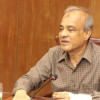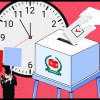BNP switches to election mode

Along with popularity, we'll also consider who remained loyal and faced state repression over the past 14-15 years while nominating candidates.
As the interim government eyes February for the national election, the BNP has shifted its focus to finalising its candidate selection process and completing local-level groundwork.
Party insiders said that while they earlier demanded polls by December, Chief Adviser Muhammad Yunus's recent indication of bringing the timeline forward from April has boosted morale in their grassroots.
BNP leaders said they aim to complete most preparations before the official election schedule is announced. Meanwhile, local-level surveys and assessments are already underway to gauge the popularity and acceptability of potential candidates.
However, political analysts warned that internal rifts during the finalisation of nominations could hurt the party's image. They advised the BNP to give importance to candidate lists prepared at the grassroots, as these reflect local sentiment and could help prevent infighting.
Party insiders also expect tensions once the nominations are announced. Any internal discord, they fear, may be used by rivals to question the party's unity.
According to leaders, the party will not follow a single formula for nominations. Along with survey results, candidates will be assessed based on their involvement in the July–August movement, long-term participation in anti-government protests, experience of persecution, and public reputation.
CANDIDATE SCRUTINY
As per the party's constitution, BNP's Parliamentary Board will select candidates from a shortlist recommended by each constituency. The Standing Committee will serve as the board.
Khandaker Mosharraf Hossain, a member of the Standing Committee, told The Daily Star that applications will be invited after the election schedule is announced. Nomination interviews will be conducted, and input will be collected from upazila and district units.
Mosharraf said that popularity has always been a key factor, as chances of winning depend on public support.
"Along with popularity, we'll also consider who remained loyal and faced state repression over the past 14–15 years while nominating candidates."
Leaders said the ability to lead in parliament and assume governance responsibilities will also be considered -- candidates must be thoughtful and responsible, not just symbolic figures.
Opinions from the grassroots will carry significant weight, they said. A candidate with strong local support may be selected despite minor shortcomings. In cases with multiple qualified contenders, the final decision will consider administrative input, organisational recommendations, and field reports.
BNP leaders acknowledged that while it may not be possible to find candidates entirely free of controversy, those with minimal baggage will be prioritised.
Standing Committee member Salahuddin Ahmed said, "We will choose candidates whom people can accept and who are not widely controversial. Some degree of controversy may exist, but the less controversial ones will be prioritised."
The July uprising, he added, will be a key consideration in candidate selection.
ELECTION VIBE
Speaking to The Daily Star yesterday, Salahuddin called on the interim government to formally notify the Election Commission of the February timeline, as discussed in the meeting between Yunus and BNP acting chairman Tarique Rahman in London.
"An election environment and excitement have arrived. As a political party focused on elections, we are always ready. We update our strategy when needed, both before and after the election schedule is announced."
Party sources said Tarique has become more engaged at the grassroots level since August 5 through events linked to BNP's 31-point reform agenda.
During the Awami League's rule, he avoided public interaction due to restrictions on airing his speeches. But over the past 10 months, he has taken a more active role, enabling him to better assess district-level leadership.
BNP activists have already begun early campaigning — posters, placards, and billboards showcasing the party's 15-year struggle are visible in many areas.
Groups of party activists are holding indoor meetings, outdoor rallies, and door-to-door campaigns. The leadership has warned that any signs of infighting could lead to disciplinary action.
SEAT-SHARING
BNP leaders said discussions with allies on sharing seats will begin soon. These include Nagorik Oikya, JSD (Rab), Biplobi Workers Party, Ganasamhati Andolon, LDP, Gono Odhikar Parishad, Ganoforum, National People's Party, Bangladesh Jatiya Party, Nationalist Democratic Movement, and the 12-Party Alliance.
A senior leader, requesting anonymity, said, "We haven't formally discussed seat-sharing yet in the party forum, but talks with allies will begin shortly. The main challenge will be balancing respect for partners with our own electoral strengths."

 For all latest news, follow The Daily Star's Google News channel.
For all latest news, follow The Daily Star's Google News channel. 








Comments